Anticoagulant Natural Alternative
Natural Anticoagulant Regimen
A natural anticoagulant routine. How could this benefit you? How can you implement this? Why is this a time-proven alternative to conventional approaches?
Hopefully, you have read part1, part2, and part 3 of this 4 part series. Primers on coagulation and thrombosis. I have carefully explained the process of coagulation resulting in heart attacks and strokes. We have talked about platelet aggregation. Which then leads to fibrin aggregation. Which leads to the final clot. All clots cause obstruction. Obstruction causes heart attacks and strokes. How can we prevent this?
I have alluded to the most powerful natural anticoagulants. These include the following:
- Nattokinase — 100 mg twice daily
- Ginkgo biloba — 120mg daily
- High-dose fish oils — 1 tablespoon (10 grams) daily
- Vitamin E — 800-1200 units daily
- Adequate hydration — many glasses of pure water daily
Nattokinase
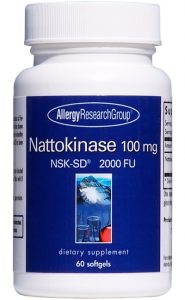 Let’s start with Nattokinase. Nattokinase is a derivative of the natto bean. This is a Japanese food source. Nattokinase is a serine protease produced by Bacillus subtilisduring during fermentation. Nattokinase is very bitter to the taste! Unpalatable. Therefore, the standardized extract is preferable and convenient.
Let’s start with Nattokinase. Nattokinase is a derivative of the natto bean. This is a Japanese food source. Nattokinase is a serine protease produced by Bacillus subtilisduring during fermentation. Nattokinase is very bitter to the taste! Unpalatable. Therefore, the standardized extract is preferable and convenient.
Nattokinase is a fibrinolytic agent. You can refer back to all previous fibrin pathways. The goal is to prevent fibrinogen converting to fibrin.
Nattokinase has been studied extensively by the Japanese. Nattokinase biochemical activity is labeled in FU. That is fibrinolytic units. These activity units have a mg equivalent. A typical dose is 100 mg (2000 FU) twice daily. It is essential that you take this twice daily. Once daily is insufficient. This has been time proven through empirical observation.
I have treated thousands of cases with Nattokinase preventing recurrent thrombophlebitis, strokes and heart attacks. It is essential that you source NSK-SD.
There are alternatives to Nattokinase. Lumbrokinase is derived from the earthworm. It is commonly sold as Bolouke in Canada. By the manufacturer’s claims, it is even more potent. Higher biological activity. Serrapetase has similar but not identical properties. I use Serrapetase to treat arterial plaques.
Here is a great reference paper on the fibrinolytic and anticoagulant properties of Nattokinase.
Ginkgo Biloba
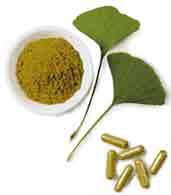 Ginkgo biloba has many actions. This is a time-honored and venerated Chinese herb. Ginkgo biloba has multiple constituents. These are flavonol and flavone glycosides, lactone derivatives (ginkgolides), bilobalide, and much more. We use a standardized 26% ginkgo extract. The Germans have studied this in detail. Reference the German E Commission. Here is a more readable guide.
Ginkgo biloba has many actions. This is a time-honored and venerated Chinese herb. Ginkgo biloba has multiple constituents. These are flavonol and flavone glycosides, lactone derivatives (ginkgolides), bilobalide, and much more. We use a standardized 26% ginkgo extract. The Germans have studied this in detail. Reference the German E Commission. Here is a more readable guide.
The dose I recommend is 120 mg daily. Or 60 mg split twice daily. German studies have advocated as high as 240 mg. Through empirical observation, I find this dose to be way too aggressive. Ginkgo is so potent that 240 mg will probably cause adverse bleeding.
Ginkgo Biloba exerts its action primarily as an anti-platelet anticoagulant drug. It inhibits platelet aggregating factor. Ginkgo has many other uses. It is an antioxidant. Ginkgo may have vasodilatory effects. It is used for cognitive enhancement. I find it much more effective as a cardiac protective drug.
Be careful with your dosing ginkgo biloba. I advocate the use of 4Sight. This is a potent combination used to prevent eyesight deterioration. It includes 60 mg of ginkgo biloba. It is one example of adjusting the total dose of ginkgo biloba. And that is, again, 120 mg.
Because of its action, ginkgo biloba should not be combined with aspirin or NSAIDs. It will have synergistic effect.
High-dose fish oils
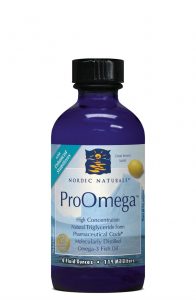 High-dose fish oils have a “rheological” effect. That is the prevent aggregation of red blood cells. It is the aggregation of platelets and/or red blood cells is the initiating process. High-dose fish oils act like Teflon to prevent this aggregating effect. The dose that I recommend is aggressive. 1 tablespoon daily. You will rarely achieve these doses with oral capsules. I highly recommend fish oils in liquid form.
High-dose fish oils have a “rheological” effect. That is the prevent aggregation of red blood cells. It is the aggregation of platelets and/or red blood cells is the initiating process. High-dose fish oils act like Teflon to prevent this aggregating effect. The dose that I recommend is aggressive. 1 tablespoon daily. You will rarely achieve these doses with oral capsules. I highly recommend fish oils in liquid form.
Fish oils contain EPA (eicosapentanoic acid) and DHA (docsoahexanoic acid). I recommend 4000-5000 mg of EPA and 3000-4000 mg of DHA. That would total approximately 10 grams of fish oil. 1 tablespoon of high potency fish oil will yield this high dose of 5000 mg EPA and 4000 mg of DHA. I stress again, you will not achieve these doses with fish oil capsules.
Fish oils, in addition to their anticoagulant effect, may have multiple benefits:
- enhance brain function – cognitive enhancement
- prevent cardiovascular events
- antidepressant
- improve skin turgor
- lower blood pressure
- treat gastric reflux
Vitamin E
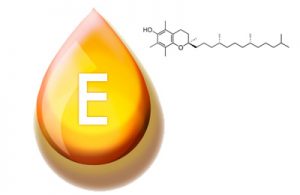 Vitamin E also has rheological properties. It prevents red blood cell aggregation. Vitamin E exists as a family of tocopherols.
Vitamin E also has rheological properties. It prevents red blood cell aggregation. Vitamin E exists as a family of tocopherols.
I highly recommend mixed tocopherols. This is a isomeric mix of natural tocopherols including the alpha, beta, gamma and delta forms of vitamin E. There is a difference between “natural” vitamin E and “synthetic” natural vitamin E. Synthetic vitamin E is a tocopheryl not tocopherol.
I routinely recommend a 400-800 units of mixed tocopherols (vitamin E) daily. In many instances I will recommend 800-1200 units of vitamin E. Studies have shown that Gamma tocopherol is much more potent than alpha tocopherol. Most studies only investigate the alpha form of Vitamin E.
Water – Hydration
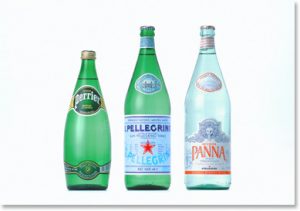 And last but not least, hydration. Keep well hydrated. Hydration will also prevent red blood cell and platelet aggregation. It will improve skin turgor. I highly recommend water in glass bottles, not plastic bottles. You should avoid all plasticizers. PVCs, phthalates and BPA. The softer the plastic bottle the higher the plasticizer content. Never tap drink water. Most likely, all your municipal water sources are contaminated or polluted. Chlorine, chloramine, flouride, and heavy metals. Flint Michigan is just the tip of the iceberg.
And last but not least, hydration. Keep well hydrated. Hydration will also prevent red blood cell and platelet aggregation. It will improve skin turgor. I highly recommend water in glass bottles, not plastic bottles. You should avoid all plasticizers. PVCs, phthalates and BPA. The softer the plastic bottle the higher the plasticizer content. Never tap drink water. Most likely, all your municipal water sources are contaminated or polluted. Chlorine, chloramine, flouride, and heavy metals. Flint Michigan is just the tip of the iceberg.
Potency and efficacy
So this routine when fully implemented will prevent platelet and red blood cell aggregation. It prevents the conversion of fibrinogen to fibrin. This treats all pathways of coagulation. It is a much more comprehensive approach to anticoagulant therapy than conventional drugs. Less expensive. With fewer complications. Is it effective?
Virtually every surgeon now has been taught to ask, “what other vitamins and herbs are you taking?” Every surgeon knows that each and all of these agents clearly have anticoagulant effects. Surgeons see the effects of drugs. Internists only infer the effects of drugs. Surgeons know that prior to surgery anticoagulants can significantly increase complications. However, just following surgery the opposite effect is noted. The body may react with a vigorous coagulation response.
So empirically and rationally you can see this routine has the ability to effectively prevent heart attacks, strokes and recurrent thrombophlebitis.
Medical Supervision is Essential
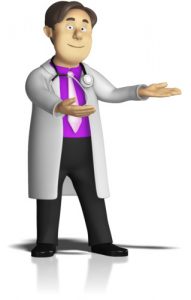 A major caveat! I never advocate abruptly stopping conventional anticoagulant routines. You need medical supervision to start and monitor your progress. This anticoagulant routine requires special knowledge of potency, dosing and the value of these natural sources. I have been treating thousands of cases over the past 20 years. This is time-tested. It is effective. But this regimen is not “validated” through conventional guidelines or task force committees. It is not the “standard of care.” For this reason, your internist, cardiologist or family practitioner will have little understanding of the rationale or efficacy of this routine.
A major caveat! I never advocate abruptly stopping conventional anticoagulant routines. You need medical supervision to start and monitor your progress. This anticoagulant routine requires special knowledge of potency, dosing and the value of these natural sources. I have been treating thousands of cases over the past 20 years. This is time-tested. It is effective. But this regimen is not “validated” through conventional guidelines or task force committees. It is not the “standard of care.” For this reason, your internist, cardiologist or family practitioner will have little understanding of the rationale or efficacy of this routine.
This is not a DIY — do it yourself advocacy.
So where do we go from here? Let me give you some suggestions. Call us or write for further information.
call 408-358-8855

16 thoughts on “Anticoagulant Natural Alternative”
Having run out of curcumin, I’m now having to take over 100,000 fibrinolytic units of nattokinase a day to stop clots hitting my lungs (up to 15 of those now in total) and to be able to lie down without feeling my circulation shutting down where the pressure from my weight blocks the flow (and I’m not overweight), so it may have been making a bigger difference than I thought.
Thanks for replying. Further update: I took 720mg of Gingko every day for two weeks to test it more rigorously, then stopped taking it altogether and haven’t taken any since as this made absolutely no detectable difference. Curcumin is more effective, but even taking six 475mg capsules a day (the highest dose of the pure curcumin I could find on the market) was insufficient to enable me to reduce significantly the amount of nattokinase I was taking, so I’m still having to take 72,000 to 84,000 fibrinolytic units of it a day. I’m no longer experimenting with natural anticoagulants as they’re just too weak and the experiments too dangerous (up to 13 clots have hit my lungs now), with the exception of nattokinase which seems to have a greater thinning effect than the rest in addition to it’s more powerful ability to break down clots as fast as they form, but I’m also being careful not to take too much of it to guard against the risk of a brain hemmorhage. I let the level fluctuate enough to allow some clotting to drive essential repairs and take most of it in the run up to sleeping when most of the unwanted clotting occurs and needs to be countered.
Hello David,
I see you have entered 3 comments. This routine we advocate is not a DIY routine. It requires experienced medical surveillance and guidance. Clearly, you have faced the most challenging condition. This natural routine is preventive (prophylactic). Much more difficult to reverse established clots (thrombosis). We only recommend specific brands of Nattokinase, Ginkgo and Vitamin E. Nattokinase must be NSK-SD sourced. And it may be more difficult sourcing this in the UK, because of European restrictions — CODEX. From our experience, we do not recommend exceeding 180-240 mg of Ginkgo Biloba daily. Or 100 mg 3 times daily of Nattokinase. Without knowing more intimate details, you may be one of those exceedingly rare individuals who needs daily low molecular weight (LMW) heparin injections. Warfarin only leads to more long-term complications.
Update: I’ve now tried gingko and found that even 480mg a day has no effect whatsoever – it is clearly not an anticoagulant. Experimenting with it actually led to another blood clot hitting my lungs because I reduced the amount of nattokinase I was taking to try not to overdo the expected thinning. Coumarin works, but the quantity you get in cinnamon cassia varies too much to depend on it. Curcumin works too, but the overall effect of it is less than that of nattokinase and so it’s a lot more expensive. I was going to try ginger, but the most affordable supplies of that are too unreliable to depend on them. I have yet to try vitamin E.
Change of plan: I’m now experimenting with Turmeric (curcumin) and Cinnamon cassia (coumarin – this inhibits vitamin K) as they appear to be stronger anticoagulants than vitamin E. Ginger also looks like a good contender, but I’ll save that up for later in case I need to discontinue one of the others. Importantly though, I’m only going to take just enough of these to eliminate the clearest symptoms rather than trying to get anywhere near to the equivalent amount of Coumadin/warfarin that people are normally put on, because they are given excessive levels to prevent clots forming at all due to the inability of warfarin to break clots down, whereas I can continue to use nattokinase for that part of the job without the lower amount of thinning being a risk. I don’t recommend that anyone copy this unless they run up against the same kind of wall of incompetent doctors blocking access to more suitable medications.
I’ve had nine blood clots hit my lungs over the last year, but I ran into a wall of doctors who blocked the way to any treatment after one wrote off the first pulmonary embolism as a panic attack on the basis that I shouldn’t have recovered so well (that was the closest one to being lethal), and the main aim of the others appeared to be to back her up. To try to stop the clots coming, I’ve gradually been pushed by a series of lesser incidents up to 72,000 fibrinolytic units of nattokinase a day (plus 300mg of Aspirin – larger doses don’t seem to make any difference beyond adding to risk) and it still isn’t enough to make sitting or lying down comfortable – I can feel my circulation being shut down by the pressure. This is already a higher dose than I’ve ever heard of anyone else taking and I don’t like pushing into unknown territory, so I’m now going to try to see if I can reduce that by taking 2000 to 3000 units of vitamin E a day to try to stop the clots forming in the first place instead of relying primarily on breaking them down after they do. I don’t know if you have any advice to offer, but someone ought to be informed about what I’m doing in case it helps others. It is frustrating that I can’t simply access guaranteed-genuine warfarin which I’d like to take in low dose while topping up with nattokinase which looks like the safest treatment regime.
Thank you for your query and reading the blogs. Without knowing your complete past history it is difficult to offer advice over the Internet. It does appear that your current injections are “preventive.” And not based on significantly increased risk. The natural anticoagulant routine is highly effective with less side effects. To be quite nearly 100% effective, you do need to follow this regimen completely. The alternative to your injections is Nattokinase 100 mg (from a reputable source) twice daily. Keep reading.
Greetings and thank you for these series of articles. I recently had an accident which caused a slight or petit fracture in my Metatarsal bone closest to the ankle. I have a cast which I am told I must wear from two months and was prescribed a enoxaparin treatment (Sodium injection) to take everyday until the cast comes off. The cast leaves my toes open and covers the lower part of my ankle. First, I am very uncomfortable giving myself daily injections and second, I am a naturalist. I avoid taking over the counter drugs and medication if possible and prefer to use more natural alternatives , such as the regimen you’ve detailed in part 4 of this series on Anti coagulation. Do you think I might be a good candidate for this regimen? And, does the require me to take all of the items mentioned above or to follow a daily dosage of just one to be effective. I currently have Vitamin E capsules, Ginkgo Biloba and Fish Oil capsules although they are not potent enough as you mentioned in the article. I also regularly take raw garlic and use ginger and tumeric in teas and while cooking. This happened only two days ago and I would really like to avoid taking the injection recommended by the doctor that looked at my injury. I am also in a country where Bed-side manor and volunteering information is somewhat unheard, so I it is difficult to get my questions answered. I would really appreciate your assistance. Thank you
Thank you for your question. That is the current convention. However, Coumadin unavoidably will cause osteoporosis and hasten coronary artery and heart valvular calcification — in time. You can indeed increase your leafy green intake by simply re-adjusting the dose to still achieve the desired INR value. You will need to come to some accommodation with your cardiologist what is the target INR. Will they accept a lower INR value? Be conscious of maintaining adequate iron intake as well to prevent iron deficiency anemia.
Dear dr. Miller,
My husband (66 years old) was diagnosed with aortic stenosis and was operated a few days ago. I understand that, with a mechanical heart valve, he is unavoidably doomed to warfarin for the rest of his life. It also appears that he is to avoid green leafy vegetables and all the food that „thins“ blood. We strongly dislike that idea, since we have been on macrobiotic diet for 30 years and that vegetables, beans etc. form a large part of what we eat. Is it, in principle, possible to make some kind of balance between food that contains vitamin K and food that prevents blood clotting (if he checks his INR regularly at home)? Or is it possible that a patient reduces warfarin if he takes some natural anticoagulants?
Yours sincerely, Duska Klikovac.
My cardiologist says I have occasional A-Fib and wants me to take Eliquis 5mg 2xDay for the rest of my life (age 75) I have NO symptoms and feel good. I would like to use a natural anticoagulant(s) rather than spend almost $500/mo. forever.
What are your thoughts?
Thank you.
my friend just turned 80. he had a lower right cerebrum stroke
on dec. 28, 2018. he has been in 5 hospitals since first being flown by helicopter to uc davis in sacramento, california. he seems fine, except that due to balance struggles he does not walk independently yet. he would no doubt prefer to do natural anticoagulant. he likes natto. does he need to take the digoxin in the mornings for afib even with natural anticoagulant? how does he get off the Xarelto (rivaroxaban)?
he has medicare and medi cal in california.
thanks. t in northern california
Thank you for your query. Yes, you would be a good candidate. This natural approach requires careful explanation, guidance and follow-up. You can contact me direct at [email protected].
I have persistent atrial fibrillation, first discovered in 2012. I am male, age 68, chadvacs score 2 (65+ and CAD). I would try to seek your services to guide me in using the natural anticoagulant alternative for stroke protection.
Thk you
Thank you for writing. And apologies for a slight delay in responding. This is a difficult question that I face more frequently. How to treat each condition where Plavix or similar antiplatelet drugs are prescribed for serious conditions. Or even stronger anticoagulants such as Coumadin are prescribed for anticoagulant therapy. The blogs on anticoagulation are admittedly complex and scientifically written to provide each of my readers with a solid and convincing picture. Showing you the complex cascade of coagulation and how more rationally to treat this with less toxic approaches.
A “glib answer” is not possible. This requires a very thorough discussion with an understanding of risk-benefits of any alternative therapy. But with the correct guidance and timely follow-up there are good alternatives. Feel free to contact me personally at [email protected]
I had a heart attact and have a stiant implant i was told to take plavix which i have all the side effect from it what is my best thing to replace it